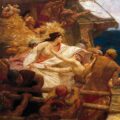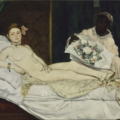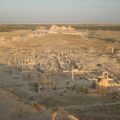Marguerite Yourcenar’s Revenants

The hardest thing about the hard spells in life, as the Franco-Belgian author Marguerite Yourcenar observed, is that they repeat themselves. People tend to fall into the same ruts over and over, bump into the same corners of the same corridors. Born in 1903 and dying at the age of 84, Yourcenar lived through what she rightly called the worst times in history. The current pandemic might seem the merest inconvenience by contrast—at least for those who have homes, incomes, and the luxury of isolation. At this writing, we have been practicing social distance for nine tedious months, our days indistinguishable from one another, the same ruts, corners, corridors, and death is in the air.
Yet house arrest has its compensations, not least, time enough to revisit the classics of antiquity or, finally, to open the great works of more recent times, many of them big books, all of them meant to be read without haste. Le Labyrinthe du Monde, Yourcenar’s superb three-volume set of memoirs, is one of the latter. It is a twentieth-century masterpiece.
Yourcenar wielded a command of her language and an immense vocabulary in distinctly musical prose. At times, her writing is aphoristic: “In every age, there are people who do not think like everyone else, that is, who do not think like those who do not think.” Elitist, one might say, not a twenty-first century sentiment—I’ll return to this—but nonetheless memorable. Other sentences are reminiscent of Proust or James in their length, complexity, and narrative momentum or descriptive power. But most are conversational in tone. They sound uncontrived, seem to have been well structured and precisely worded just as they streamed from Yourcenar’s pen. Her fluent writing style is already reason enough to read the memoirs, which were published by Gallimard under the titles Souvenirs Pieux (1974), Archives du Nord (1977), and Quoi? L’Éternité (1988).
These works give unmediated voice to Yourcenar’s uncommon insight and unremitting determination to think for herself and to tell the truth as she saw it. Late in her life, toward the end of these memoirs, she would assert, “The more the road behind me stretches out, the more I see that, of all our evils, the worst is imposture.” In writing about her early years, she says she is almost desperate to evoke memories that are entirely her own and to avoid any cloying images of childhood. What adults tell children seems false to them, or at least unimportant. “Very early, the Good God of whom they told me so much seemed to me anything other than a good God.” She mentions hearing her nursemaid speak of old women coughing under their blankets, recalls having once seen a pale child nailed into a box for the cemetery, says she saw, on the road, animals that had been crushed by the first automobiles. “God had not been good for them.” Where the novels are polished products of Yourcenar’s mind, while the memoirs show that mind at work.
When Yourcenar was two weeks old, her mother, Fernande, died of puerperal fever and peritonitis. Would Yourcenar have loved her mother, she wonders? Everything leads her to believe that she would first have loved her egoistically and distractedly, like most children, and later with an affection born primarily of habit, crisscrossed by quarrels and increasingly attenuated by indifference, like many adults who love their mother. “I do not write this to displease,” she writes, “but to look reality in the face.” Yourcenar denied that she felt her mother’s absence as a privation. She was raised, for the most part, by her father, Michel, who loved gambling, along with his mother, the unbearable Noémi, “that abyss of pettiness,” a woman whom her father detested but needed.
Yourcenar was not formally schooled. Her father shared books with her—one of Romain Rolland’s works, in particular, advanced her penchant for independent thinking—and sometimes he engaged private tutors for her. “From my ninth to my eleventh year,” she says, “something at once abstract and divinely carnal rubbed off on me: the taste for color and forms, Greek nudity, the pleasure and glory of living.” She was a frequent visitor to museums of art.
She read, and she read, and she read. As a child, Yourcenar immersed herself in the Latin and Greek authors. Virgil was a favorite. Between the ages of seven and eighteen, she would sample the whole corpus of French literature and at least a part of the English canon. In her mid-twenties, she discovered her contemporaries—Proust, Gide, Rilke, Mann. Along with travel (and the concomitant opportunities to visit exhibitions), reading was her lifelong avocation; at seventy-seven, she wrote an essay on the works of Yukio Mishima.
One of Marcus Aurelius’s teachers taught him “to wear great learning lightly,” and while Yourcenar did not make too much of her intellectuality, neither did she take any pains to downplay it. She wore it not lightly but comfortably. Her memoirs are filled with the names of museums and cherished paintings, authors and beloved books. There is no posturing in her writing about them. Yourcenar simply assumes that her readers are also at home in the realm of European arts and letters. She was not pretentious, but self-assured, and, if she sometimes sounds elitist to our ears, that is chiefly attributable to cultural differences. Of her paternal grandfather, she says, “Michel-Charles is not a great man. I would define him as an ordinary man, if experience did not teach us that there is no ordinary man.”
Yourcenar came to know her mother Fernande by telling her story. She wondered whether her mother had a physical relationship with her close friend at a convent school—“sensual intimacy between two people of the same sex,” she commented, “is too much a part of our species’ behavior to have been excluded from the most rigid boarding schools of the old days”—but concluded probably not. She spoke of Fernande’s marriage to Michel, described their travels, explained in detail the circumstances surrounding her death.
Her mother became, in the end, “like the imaginary or real personages whom I nourish with my substance in trying to make them live, or live again,” in the one case fictional characters, Alexis, for example, or Zeno, in the other, historical figures, most notably Hadrian and Antinous. So vivid was Yourcenar’s imagination, so porous the boundary between lived and visualized experience, and between present and past, that people she created or encountered in novels and histories seemed to stand before her.
Time, she says, ricochets like sunlight on puddles; she loves Zeno like a brother. She recalls seeing, in the first grown-up book she attempted to read, an image of a boat with a purple sail, on the Nile, at sunset, against the green background of the palm groves and the ginger background of the desert. “A feeling of wonder invaded me, so strong that I closed the book. The boat continued to sail up the river, consciously or unconsciously, in my memory, for forty years…. One day I would see a grey-haired man weeping on this deck.” He is the emperor Hadrian in the year 130 CE.
Yourcenar explored her origins with a level of interest that bordered on obsession. From Fernande, Michel, Noémi, and Michel-Charles, she went well past her parents and paternal grandparents to talk about generations of ancestors on both sides, and to describe the mansions in which they lived in Belgium and the North of France. For example, she devoted 87 pages to Octave Pirmez, a minor Belgian essayist of the nineteenth century, and his suicidal brother, Rémo. By default, she calls Pirmez “Uncle Octave.” He was a child of her maternal great-grandmother’s sister. I won’t try, any more than she did, to find the proper term for this labyrinthine relationship.
Genealogy, “that science so often placed in service to human vanity,” leads first to humility before such a multitude, then to vertigo. She had hoped to discern some of her own traits in her ancestors, but the similarities she discovered here and there proved, upon inspection, to be held in common with all creatures. So much the better for us today. We have time on our hands, the stories are well told, and it is edifying as well as entertaining to see how we differ from, and yet resemble, “this man in a frock coat and that woman in crinoline.”
The same objectivity was brought to bear on Yourcenar’s own life, as though she were her own ancestor. She conducted research, studied old photographs, and wrote of herself in the third person. The memoirs open with the statement, “The being I call me came into the world on a certain Monday, June 8, 1903, toward eight o’clock in the morning, in Brussels….” Another passage bears quoting at greater length:
The child, herself, is about six weeks old. Like most human newborns, she gives the impression of a very old being who is going to grow young again. And, in effect, she is very old: whether by blood and ancestral genes, or by the unanalyzed element that, in a beautiful and ancient metaphor, we call the soul, she has gone through centuries. But she knows nothing of it, and that’s all the better.
With a gathering sense of herself, Yourcenar would come to speak in the first person, as the bright child discovering the world and, in time, as the novelist whose imagination is still so vibrant that writing becomes an act of submersion. “Literary creation is a torrent that carries everything away; in this flood, our personal characteristics are, at the very most, sediments.”
Why did Yourcenar commit so much time to this work? As a rule, people write memoirs in order to retrace and document the stages of their intellectual, emotional, sensual, and spiritual development, to see how they became themselves, in a form that affords them greater artistic and thematic freedom than would a chronologically ordered autobiography. Yourcenar is no exception here. Long before starting the third, and most personal, volume of Le Labyrinthe du Monde, she wrote, “The incidents of that life interest me above all as access roads by which certain experiences reached her.” Notice that here she uses both the first and third persons. “It is for that reason, and for that reason alone, that I will perhaps record them someday, if the leisure is given me, and if the desire comes upon me.”
But memoirists often recount their meaningful experiences for a further reason, one that, despite her disavowal, might possibly have motivated Yourcenar as well: to share their world before they die and it vanishes with them. In any case, it seems to me that we read memoirs, not merely for cultural enlargement, nor simply for love of the language, but for admittance to the writer’s domain as she sees it, that is, for direct contact with her mind. Whether or not Yourcenar meant to preserve the world of her experience, she did so, and it was populated not only by people with whom she had to do, family members, friends, publishers, editors, lawyers, but also by individuals who, although imaginary or long dead, were as real to her as the Marguerite whose childhood she recreated.
“The older I grow,” Yourcenar writes, “the more I notice that childhood and old age not only meet but are the two most profound states we are given to live. The essence of a being is revealed in them, before or after the efforts, aspirations, ambitions of life.”
Outside, the pandemic spreads, hospitals fill up, the death count rises. Aging men and women, people of my generation, huddle at home, alone or in pairs, take the dog on long, solitary walks, occasionally have video calls with their children, grandchildren, and surviving siblings. They pretty much neglect their friends. My advice: tend to your loved ones as carefully and devotedly as Yourcenar did. Then wash your hands of the news, choose a good book from any period—preferably a long book. Read, reflect, rediscover yourself, renew the sense of wonder you started with, the curiosity that kept you going. It will be time well spent.
About
Formerly an investment professional at major insurance companies and international banks, Philip Newman Lawton now writes essays and narrative nonfiction. His work has appeared in JuxtaProse Literary Magazine, the Bookends Review, Cagibi, Streetlight Magazine, the Bangalore Review, Dappled Things, and the Woven Tale Press, among others.





